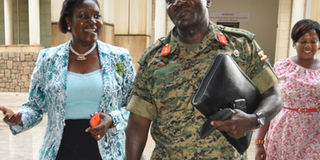How South Sudan crisis exposed gullible MPs

Chief of Defence Forces Katumba Wamala (R) leaves Parliament after a special sitting on Tuesday. Left is state minister for Fisheries Ruth Nankabirwa. PHOTO BY GEOFFREY SSERUYANGE
What you need to know:
If MPs are too gullible to ask the hard questions, then, Ugandans should be told: Who is footing the bill, how long is the deployment; what are the effects of this mission on our fragile economy?
At first, we thought Speaker Rebecca Kadaga had recalled Parliament to approve the deployment of our soldiers to the strife-torn South Sudan. We were also told that the commander-in-chief had written to Speaker requesting for ‘retrospective’ authority to send more troops to South Sudan on “peacekeeping” and if necessary “peace enforcement” mission.
While President Museveni’s letter appears to have been written on December 24, 2013, it bears a stamp of the Speaker’s office showing it was received on January 9, 2014. Ms Kadaga was quoted on TV saying State House was acting in bad faith by trying to portray that the President had long informed her to recall Parliament but she had been delaying the process.
The hullabaloo over the President’s letter aside, it is not clear why a letter by the President to the Speaker on an urgent matter such as this would take two weeks before it is delivered. Skeptics in Parliament claimed the President’s letter was a “panic response” which was perhaps back-dated to rout members’ accusations that the commander-in-chief had deployed troops in a foreign country without the approval of Parliament as required by Article 210 (d) of the 1995 Constitution.
Anyhow, Speaker Kadaga went ahead and recalled the House for a special sitting on Tuesday presumably to “approval” the UPDF mission to South Sudan. However, realising that by the time our soldiers officially landed in Juba (December 19), Parliament was not in recess and the permission was not sought for “peacekeeping”, the President alluded to in his letter to Kadaga. Even if the House was in recess, the 21 days under Section 39(3) had elapsed, again, without any explanation.
It was on account of these glaring loopholes that Kadaga directed that Defence minister Chrispus Kiyonga’s motion on deployment of UPDF soldiers to South Sudan be moved under Section 40. However, in the process of drafting the Status of Forces Agreement, Section 40 of the UPDF Act, does not in any way require parliamentary involvement. This explains why Kadaga told MPs that they came to receive information/update on the deployment and not approving the deployment of our soldiers in a foreign country and in total disregard of the inner meaning of Article 210 (d) of the Constitution.
From the onset, there was something wrong with the deployment of our soldiers to South Sudan. This deployment is well-intentioned, and I entirely agree with the President, especially where he said given the importance of South Sudan to peace in northern Uganda, DRC and CAR, “Uganda cannot and should not stand aloof and watch the situation deteriorating”.
In the face of government mendacities, Dr Kiyonga’s motion bore the hallmarks “uncoordinated movement of troops”. For instance, ministers led by the Prime Minister, Mr Amama Mbabazi, assured ‘gullible’ members that the government was not sending UPDF soldiers to South Sudan on a peacekeeping mission because there was no peace to keep yet the President had actually written to the Speaker requesting to send our troops on a peacekeeping mission.
Given the stature and intricacy of South Sudan mission, Parliament should have discussed the matter with bipartisan lenses. The House defence committee should have discussed the deployment of our troops to South Sudan with the line minister to iron out the sticking issues.
Speaking at the International Conference on the Great Lakes Region in Angola, Mr Museveni said the Uganda army was actively fighting rebels in South Sudan. He also disclosed that Ugandan soldiers were killed and others injured when the UPDF engaged the rebels just 90 kilometres outside Juba, just a day Dr Kiyonga and the Chief of Defence Forces, Gen Katumba Wamala, fooled Parliament that UPDF was not involved in direct combat.
The lies notwithstanding; the government should answer the hard questions and correct mistakes before it is too late. Ugandans should be told: what informed the government decision to take sides in the conflict? Why Parliament was misinformed on the neutrality of the UPDF? And what happens if the “rebel” leader, Riek Machar wins?
In trying to save face, the MPs on the defence committee on Thursday summoned Defence Minister to explain what is going on. They have also summoned Attorney General Peter Nyombi to explain the gaps in the Status of Forces Agreement, Uganda signed with South Sudan.
[email protected]




